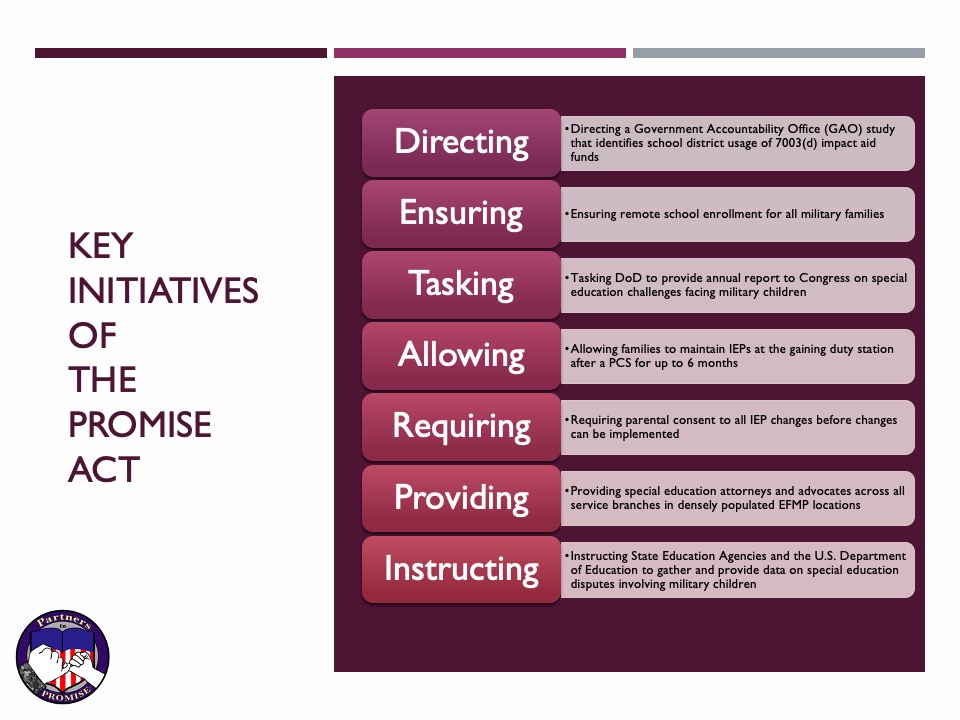
Protecting the Rights of Military children In Special Education (PROMISE)
| In the News, Partners in PROMISE in the News
Protect the
Rights
Of
Military Children
In
Special
Education
THE PROMISE ACT
Military families represent less than one percent of the population of the United States, but our lives impact the security and stability of the country. There is a saying “happy wife, happy life,” while somewhat dated, this sentiment rings true for military families. The struggles faced by our community are not on the front page of many civilian newspapers, but our lives affect everyone.
Veterans and active duty suicide rates are up. Military spouse unemployment is significantly higher than the national average. Children face emotional and educational struggles as a result of frequent moves. While many come away from this lifestyle with grit and resilience, many do not. And because of a lack of national awareness and accountability, the most vulnerable members within our community, children with special needs, are left exposed.
Michelle Norman, the 2019 Armed Forces Insurance Navy Spouse of the Year, has been battling the town of Virginia Beach since 2014. She and her family have been in and out of court fighting for an appropriate education for her daughter, Marisa, who has special needs.
Like many military families Marisa moved with her parents into a new community after her father was relocated to continue in his Naval career. Marisa had been thriving in her old school with customized resources and specialized care. When she moved to VA Beach these supports and services decreased, some eliminated and Marisa regressed academically and socially.
Marisa is not alone. There are approximately 135,000 children enrolled in the military’s Exceptional Family Member Program, requiring a wide-range of specialized care.
Rather than come to you with problems we are here with a solution. The PROMISE Act, drafted by four military mothers of special needs children asks for increased accountability, standardization and assistance to help lighten the load unnecessarily placed on these military families. Supporting this legislation will not only help special needs families, but all military families by holding school districts accountable for the federal funding they receive to teach military children across the nation.
The Military Interstate Children’s Compact Commission was created to protect military children and insist that they have the same access to education as civilian children. Although all 50 states have signed this compact, there is a lack of consistency and unintentional or sometimes even an intentional skirting of the law. Without a mechanism to enforce these laws the compact lacks the teeth it needs.
The result is many military children feel forgotten. They are embedded within communities that don’t recognize their unique struggles. These struggles are exacerbated in families with children who have special needs. Parents deploy leaving spouses defacto solo-parents trying to get through the day, not wanting to enter into an emotional or legal battle with teachers and school districts, just to ensure their children have access to the minimum education guaranteed by law.
Congress has admitted that special needs education is underfunded. Overworked teachers are unofficially obliged to provide their own school supplies. They care for and love our children and do their best. However, when already overwhelmed, without accountability or resources it is no wonder that those who require special attention suffer.
Some school districts, rather than correcting the problem, choose to “wait out” military families, knowing their unique lifestyle will likely solve the problem for them. However this is not a solution.
The PROMISE Act asks congress to hold schools accountable for the impact aid they receive. Increased accountability should not be feared. Most school districts are doing the best they can with the available resources at their disposal. If they are struggling to provide legally mandated services, our nation needs to support them so that these education gaps can be closed. It is our job to help those who educate our children, not blame or shame them. Let’s give teeth to existing legislation and start supporting our military families.
The first step is to get information through conducting a GAO study. Recently introduced legislation will do just that. We ask that you Partner with us by asking your representatives to support the PROMISE ACT.





